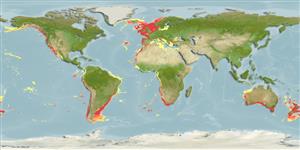Mainly demersal on continental and insular shelves, but also on the upper slopes, at depths from near shore to 550 m (Ref. 6871), but has been shown to be pelagic in the open ocean (frequently caught on floating tuna longlines over deep water, and many New Zealand-tagged specimens have been recaptured in Australia) (Ref. 26346). Occurs in small schools that are highly migratory in higher latitudes in their range (Ref. 244). There is pronounced partial segregation by size and sex in some areas (Ref. 244). Feeds on fishes (bottom as well as pelagic species, Ref. 26346), crustaceans, cephalopods, worms, and echinoderms (Ref. 244). Ovoviviparous (Ref. 50449). Targeted for human consumption, liver for squalene oil, fins for soup (Ref. 244); also utilized as fishmeal (Ref. 13563). Marketed fresh, dried-salted, and frozen (Ref. 9987). Adapts well in captivity if carefully captured and handled (Ref. 12951).
主要地栖息于大陆架与岛屿棚, 也捕食上层斜坡, 在深度从近岸到 550 公尺.(参考文献 6871) 曾经显示是大洋性的,在中开放性海域 (时常在深水域上的漂浮鲔鱼延绳钓上面捕获, 与许多新西兰附以签条的标本曾经在澳大利亚拿回了).(参考文献 26346) 形成小群鱼群那是高度迁移的在他们的范围中的较高的纬度.(参考文献 244) 有明显的部分分离依大小与在一些地区的性别.(参考文献 244) 吃鱼 (底部以及大洋性鱼种, 参考文献 26346) ,甲壳动物,头足类动物,蠕虫与棘皮动物。 (参考文献 244) 卵胎生的.(参考文献 50449) 它的肉是优良的供人类消费,肝脏用于 squalene 油,鳍用于汤;(参考文献 244) 也利用了制成鱼粉。 (参考文献 13563) 在市场上销售生鲜地了, 乾燥盐腌 , 与冷冻.(参考文献 9987) 如果小心地捕获而且触摸,适应得好在繁殖场。 (参考文献 12951)
Preferred temperature (Ref.
115969): 6.7 - 23.2, mean 12.3 (based on 7314 cells).
Phylogenetic diversity index (Ref.
82804): PD
50 = 1.0000 [Uniqueness, from 0.5 = low to 2.0 = high].
Bayesian length-weight: a=0.00479 (0.00363 - 0.00631), b=2.99 (2.91 - 3.07), in cm Total Length, based on LWR estimates for this species (Ref.
93245).
营养阶层 (Ref.
69278): 4.3 ±0.1 se; based on diet studies.
回复力 (Ref.
120179): 低的, 最小族群倍增时间4.5 - 14 年 (rm=0.033; tmax=55; Fec=6-52).
Prior r = 0.06, 95% CL = 0.04 - 0.09, Based on 2 full stock assessments.
Fishing Vulnerability (Ref.
59153): Very high vulnerability (76 of 100).
Climate Vulnerability (Ref.
125649): High vulnerability (62 of 100).
